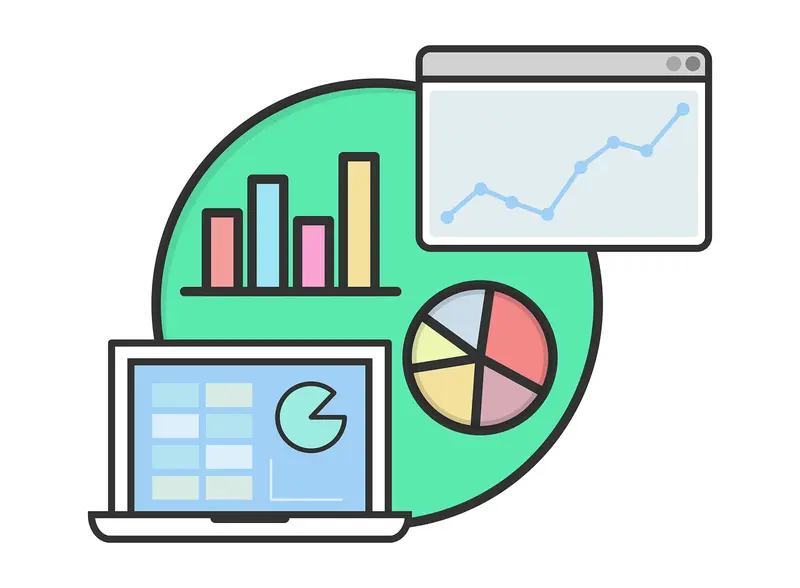Bookkeeping is essential for any business. When properly organized, it can become an effective tool for managing and running a business. It is important to learn the basics of accounting and choose the right accounting system. In this article we explain how to do effective bookkeeping in small and medium-sized businesses, how to avoid mistakes and how to choose the right accounting system.
Check also: Ranking of cryptocurrency exchanges in 2023
Highlights
- Doing effective bookkeeping in small and medium-sized businesses is essential for the proper functioning of the company.
- To make bookkeeping easier, choose the right accounting system to minimize the possibility of mistakes.
- Organization of accounting documents is very important to ensure consistency and transparency of all data.
- Using the services of a professional accounting firm can help with accounting problems.
- Proper bookkeeping is very important for any businessman to avoid tax and financial problems.
Introduction
In order to do effective bookkeeping in your business, you need to know the basics and choose the right tools. In this article we will discuss the following aspects:
- Understanding the basics of bookkeeping.
- Avoiding mistakes in bookkeeping.
- Choosing the right accounting system.
Learning the basics of bookkeeping is the first step in conducting effective bookkeeping in your enterprise. It is important to understand basic concepts and terms such as accounts, balance sheet, profit and loss and reporting. You should also learn about taxation and reporting regulations. You can seek advice from a tax advisor or use online tutorials to learn more about bookkeeping.
Avoiding bookkeeping errors is the second important part of doing effective accounting. Make sure that the balance in each account is up to date and that financial reports are accurate. You should also make sure that all records are backed up and quickly accessible when needed. It is also important to check the data regularly and make sure that the balance on each account is up to date.
Choosing the right accounting system is the third important part of doing effective bookkeeping. There are many options to choose from, so it is important to select a system that suits the needs of your business. Consider factors such as price, functionality and data security. It’s also a good idea to check reviews from other users and compare the system with other service providers to make sure the solution you choose is optimal for your needs.
Key advantages of effective bookkeeping
Maintaining effective bookkeeping is crucial for any small or medium-sized business. Well-managed accounting can provide many benefits to a business, including:
- Helping you make good business decisions. Regularly monitoring your company’s finances will help you better understand its performance and identify business strengths and weaknesses. This, in turn, will allow you to better plan and make good business decisions.
- Helping you identify savings. Monitoring your finances will allow you to identify savings in your business, allowing you to reduce costs and increase profits.
- Reducing legal risks. Compliance with tax regulations is important for any business. Maintaining effective bookkeeping will help you avoid liability for failing to comply with tax regulations.
In conclusion, effective bookkeeping can be a highly profitable investment for your business. It will help you optimize your finances, improve your business decisions and minimize legal risks.
Step by step – how to do effective bookkeeping
Maintaining effective bookkeeping for small and medium-sized businesses is an important part of management. The steps outlined below will help you organize your accounting and optimize it:
- Establish the company’s financial policy – it is necessary to establish the company’s financial policy in order to do effective accounting. This policy should include setting a budget, defining financial goals and identifying measures of success.
- Establishaccounting principles – in order to avoid billing errors, it is important to establish the accounting principles that the company will use. These rules should be appropriate to the type of business of the company and in accordance with applicable regulations.
- Determining the accounting system – in order to conduct effective accounting, it is important to choose an appropriate accounting system. This system should be tailored to the company’s needs and easy to use. It is also important that the system has the ability to integrate with other IT systems.
- Hire a professional bookkeeper – in order to do effective bookkeeping, it is important to hire a qualified bookkeeper. An accountant will not only be responsible for bookkeeping, but will also help you optimize the accounting process.
- Regular monitoring offinancial data – regular monitoring of financial data is essential for effective accounting. It is important to check your bank account balances, stock and other financial data at least once a week.
- Regular reporting – it is important to report regularly on the state of the company’s finances. This report should be prepared at least once a month and should include information on the company’s income and expenses.
If you follow these simple steps, you can easily do effective accounting for small and medium-sized businesses.

How to choose the right accounting system?
Choosing the right accounting system is a very important aspect of doing effective bookkeeping. The system must be tailored to the needs of the company and offer features that make work easier. There are many options available on the market, including cloud-based systems, desktop systems, PC-based systems and mobile systems.
When choosing, consider the following factors:
- Cost: it is a good idea to compare the prices of different systems, including subscriptions and user fees.
- Features: you can opt for a system that has customized features for your business.
- Ease of use: it is important to choose a system that is easy to use and intuitive.
- Security: the system should provide an adequate level of data security.
A good accounting system allows small and medium-sized businesses to effectively manage accounting and optimize operations. So it’s worth spending some time to carefully analyze the various options and choose the optimal solution.
How to organize accounting documents?
One of the most important aspects of effective accounting management in a small and medium-sized enterprise is the proper organization of accounting documents. How documents are stored can be key to preventing errors. The most important thing is to accurately plan and record all financial transactions and stay on top of all obligations and payments.
Here are some guidelines for organizing accounting documents:
- Create a storage system. Choose a place to keep paper and electronic files. Create folders and subfolders to organize information.
- Create filing procedures. Establish instructions on how the data is to be archived. For example, you can create paper and electronic copies for each type of document and determine how long to keep these documents.
- Ensure information security. Keep files secure by protecting them with passwords or encryption. We also recommend using antivirus software to protect your system from viruses and other security threats.
- Maintain order. Documents should be properly labeled and shared only with authorized individuals. All information should be regularly updated and organized.
Maintaining effective bookkeeping in a small and medium-sized business requires proper management of accounting documents. It is important to maintain order and protect information from unauthorized access.
When to use the services of a professional accounting firm?
Although small and medium-sized businesses may have their own accounting departments, many prefer to use the services of a professional accounting firm. Professionals at accounting offices have extensive knowledge of tax law and accounting, so they can help companies operate in accordance with current regulations. In addition, they allow companies to save time and money, as there is no need to commit resources to run an in-house accounting department.
There are many advantages to using an accounting office, but it is important to choose a professional office. The company should check that the office has the right certifications and experience, and that it has the proper licenses to do its job. In addition, it should check that it has all the necessary tools for effective bookkeeping. For example, a professional accounting system can be very useful for automating accounting processes and optimizing data.
As a business owner, you need to keep in mind that effective bookkeeping is crucial for success. Therefore, it is important to choose the right accounting firm or accounting system. This will allow the company to avoid problems and better manage its finances.
How to avoid accounting mistakes?
To avoid accounting errors, it is important to be more meticulous and carefully monitor all transactions. Companies should have a well-organized system for sharing information and documents. Moreover, it is important to have a consistent and customized accounting system. Here are the key elements to keep in mind:
- Preparation and storage of documents: It is important to properly draft and file all documents related to transactions. Make sure all documents are properly labeled and easily accessible to both you and your accountant.
- Recordingtransactions: It is important to accurately record all transactions made, along with dates and other relevant information. You should also make sure that all transactions comply with applicable financial laws.
- Checking: It is necessary to regularly check the company’s balance sheet and all transactions. Make sure you have all the necessary information and that the current data is correct.
These three elements are essential for maintaining effective accounting in small and medium-sized businesses. If you apply them as instructed, you can avoid accounting errors.
Completion
Bookkeeping is essential in small and medium-sized businesses to help maintain accurate financial records. It is important to familiarize yourself with the basic principles of accounting, choose the right accounting system and follow the financial laws. In this way, you can avoid mistakes and make sure your company maintains effective bookkeeping.
To do bookkeeping correctly, you need to:
- Organize your data – this means that all data must be up-to-date and correct, and should be easily accessible to those responsible for accounting.
- Set up a reporting system – it is important to have a system for creating financial reports that will show all the information about the company. These reports can be used as a basis for making decisions about the company’s development.
- Choose the right accounting system – it is important to choose the right accounting system for your company. The system should be easy to use and tailored to the company’s needs.
Maintaining effective bookkeeping in small and medium-sized businesses is important for a company to operate efficiently. By following the above steps and learning the basics of bookkeeping, you can ensure that your company will have well-organized financial records.
Frequently asked questions
What are the benefits of effective bookkeeping?
Doing effective bookkeeping has many benefits for small and medium-sized businesses. First and foremost, it helps save time and money while providing effective control over finances. Bookkeeping can also help companies plan and optimize their budgets, as well as improve their credibility by providing better visibility to potential investors and business partners.
How to choose the right accounting system?
Choosing the right accounting system requires careful consideration. The needs of the business and the scope of services should be taken into account. The system should be tailored to the size of the company, as well as provide tools for financial evaluation and data storage. Before choosing a system, it is a good idea to read reviews and compare prices of different products. A good system should have simple operation, easy reporting and be easy to use.
What are the most important rules for organizing accounting documents?
Organization of accounting documents is one of the key elements of effective financial management in small and medium-sized enterprises. In particular, it is important to organize and file accounting documents, such as invoices, bills and other statements. It is also important to keep all documents in a safe place and record them in a computer system.
What are the advantages of hiring an accounting firm for bookkeeping?
Hiring an accounting firm for bookkeeping has many advantages. First and foremost, it provides access to qualified personnel who are knowledgeable about tax regulations and can tailor your accounting processes accordingly. Also, it will minimize the risk of accounting errors, as professionals verify the accuracy of operations. In addition, an accounting office can provide important information and advice on running a business, which can be useful for small and medium-sized businesses.
Why is effective bookkeeping important for entrepreneurs?
Maintaining effective bookkeeping is very important for entrepreneurs, as it allows them to manage the company’s finances and use them in the most efficient way. Bookkeeping also allows you to ensure compliance with the law and maintain a transparent inventory. Besides, it suggests how to achieve tax optimization.
What are the most important types of accounting documents?
Accounting in small and medium-sized enterprises requires special supervision. The most important types of accounting documents are: bills, invoices, VAT settlements, bank accounts and any other documents relating to financial transactions.
What are the main recommendations for financial data security?
To keep your financial data secure, follow a few rules:
- Apply data access policies. Make sure that only authorized users can access financial data.
- Use strong passwords. Avoid using simple or generally known passwords. It is recommended to use passwords consisting of multiple characters, numbers and symbols.
- Keep your software up to date. Updating software is essential to protect data from viruses and other threats.
- Secure your data. Use encryption technology or other tools to protect data from unauthorized access.
Are there rules for recording financial records?
Yes, there are specific rules for recording financial records that must be followed. First and foremost, all financial documents should be stored and recorded in a way that makes their contents easily accessible and readable. In addition, financial documents should be reviewed and updated in a timely manner, and any errors or differences between financial documents and accounts should be noted and corrected as soon as possible. It is also recommended that an accounting system be selected to ensure effective and secure bookkeeping.




